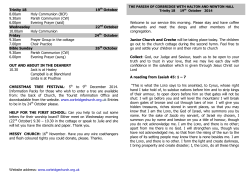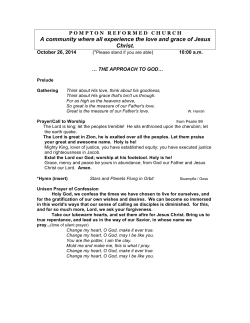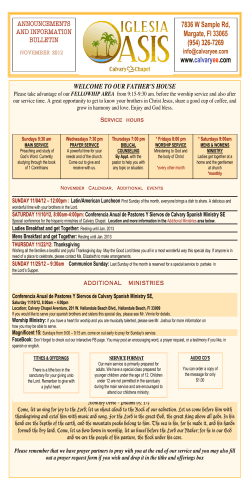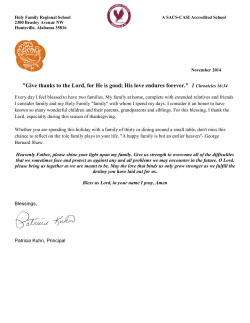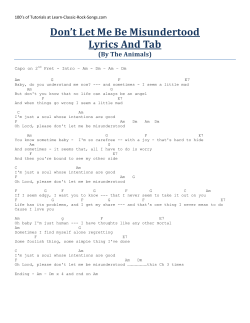
Click here to - Dec 2014 Issue
Vol 15, No.12 December 2014 CONTENTS His Divine Grace A. C. Bhaktivedanta Swami Prabhupada, Founder- Acharya of the International Society for Krishna Consciousness, came to America in 1965, at age 69, to fulfill his spiritual master’s request that he teach the science of Krishna consciousness throughout the English-speaking world. In a dozen years he published some seventy volumes of translation and commentary on India’s Vedic literature, and these are now standard in universities worldwide. Meanwhile, travelling almost nonstop, Srila Prabhupada moulded his international society into a world wide confederation of ashramas, schools, temples and farm communities. He passed away in 1977, in Vrindavana, the place most sacred to Lord Krishna. His disciples and followers are carrying forward the movement he started. To know more about Srila Prabhupada visit www.iskconbangalore.org/srila-prabhupada The Science of Knowing God 4 Srila Prabhupada Speaks Out 10 The Wonders of Lord Chaitanya 13 Sirkali Thrivikrama Perumal Temple 21 Cover pages-4 Text pages-32 Published and owned by Sankirtana Seva Trust. Editor: Chamari Devi Dasi. Layout, design and graphics by ISKCON Design Group, Bangalore. For all information contact: Editor, Krishna Voice, SST, Hare Krishna Hill, Chord Road, Bangalore - 560 010 INDIA Phone: 91-80-2347 1956, 91-80-2357 8346 Fax: 91-80-2357 8625. © 2014 Sankirtana Seva Trust, Bangalore. All Krishna art and the works of Srila Prabhupada are © Bhaktivedanta Book Trust. All rights reserved throughout the world. Reproduction in any manner is strictly prohibited. Printed at Manipal Printers (P) Ltd., Manipal. Disclaimer: We neither represent nor endorse the accuracy or reliability or the quality of any products, information, or other materials displayed, purchased, or obtained by you as a result of an offer in connection with any of the advertisements published in our magazine. We strongly encourage you to do your own due diligence before responding to any offer. Attention Subscribers: This magazine is mailed from a post office in Manipal, Dakshina Kannada District on the 5th of every month. If you do not receive the magazine or it is delayed we request you to contact your nearest post office and file a written complaint. Please send us an acknowledged copy of the same. This will help us in taking needful action at our end. Krishna Voice, December 2014 3 Founder's Lecture: Los Angeles—August 23, 1972: The Science of Knowing God To understand God one must first come to the enlivened state of liberation, free from the influence of the material modes of nature. By His Divine Grace A. C. Bhaktivedanta Swami Prabhupada Founder-Acharya of the International Society for Krishna Consciousness evam prasanna-manaso bhagavad-bhakti-yogatah bhagavat-tattva-vijnanam mukta-sangasya jayate "Thus established in the mode of unalloyed goodness, the man whose mind has been enlivened by contact with devotional service to the Lord gains positive scientific knowledge of the Personality of Godhead in the stage of liberation from all material association.”—Srimad-Bhagavatam 1.2.20 Vijnana means science. Krishna consciousness is not a concoction or speculation. It is a science, just as mathematics is a science: Two plus two equals four. You cannot make two plus two equal five, according to your whims. No. Anywhere you go, it doesn't matter, two plus two equals four, because mathematics is science. So either in America or in India or in England, everyone will accept that two plus two equals four. That is science. Science is true everywhere. Not that I can imagine my God according to my whims, you can imagine your God according to your whims. That is going on. But how can you imagine? There is no question of imagining. This bhagavat-tattva-vijnanam—this truth, this science—can be understood by a person who is mukta-sanga, freed from material association. He can understand. Mukta-sangasya jayate. And one's condition at that point will be evam prasanna-manasah—enlightened, engladdened. As long as we are in the jurisdiction of ignorance and passion, there cannot be any jubilation, there cannot be any enlightenment. Therefore we have to come to the platform of goodness. As stated in the previous verse, tada rajas-tamo-bhavah kama-lobhadayas ca ye ceta etair anaviddham sthitam sattve prasidati "As soon as irrevocable loving service is established in the heart, the effects of nature's modes of passion and ignorance, such as lust, desire, and hankering, disappear from the heart. Then the devotee is established in goodness, and he becomes completely happy." Cetah—everything is working within the heart. The heart is the central point of the body. So when the heart is not punctured by rajo-guna and tamo-guna—the modes of passion and ignorance—and you become situated in the mode of goodness, then you become jubilant. A jubilant person can understand, "Why are people working so hard like cats and dogs?" Human life is meant for understanding God. Athato brahma-jijnasa. In animal life, one cannot understand. But in human life, consciousness is developed. One can understand. That understanding is there in the mode of goodness. How does one becomes intelligent in understanding God? When he is on the platform of goodness, he can study the nature of things and ask, "Why shall I work so hard for getting all my material necessities? They are being supplied by nature. The birds and beasts are getting their food, they are getting their mates, they are being protected in their own way, they have a sleeping nest, an apartment." When we sit down in the garden, we see that even the small ant has a family, it has a home, it has food. Everything is there. From the ant to the elephant. Who is supplying? The animals do not do any business. They have no profession. But they are getting their necessities of life. The Light of Goodness Goodness means intelligence, and ignorance means darkness. In darkness, we cannot see what is what. Goodness means light. Anyone can see that all the 8,400,000 species of life are getting their food. They are getting their shelter. They are satisfying their sexual desire. They are also defending without any extra endeavour. By nature, they are doing these things in their own way. So why is the so-called civilized human being so harassed to obtain these four things? We have better intelligence. We should be more comfortable than the animals without struggling for existence. But our struggle for existence is greater than their struggle for existence. What is this civilization? This is not civilization. Everyone wants a peaceful, calm life, even those who are struggling so hard, such as big business magnates. On weekends they find some nice secluded place, without trouble. That is natural. Krishna Voice, December 2014 5 Human nature should be like that. "Why should we work so hard simply for eating, sleeping, mating, and defending?" Modern civilization is a wrong type of civilization. In the modern age human society is so made that one has to work like an ass, day and night, simply to satisfy these four necessities of life. And that satisfaction is not guaranteed. When I was in India, I was contemplating coming to your country. I thought that America is very rich, so there is no problem for eating, sleeping, and mating. But the civilization is so made that there is no shelter. People are lying down in the park, on the street. Why? There was no necessity, but you have created such a civilization that a certain section of people are lying down on the street, in the park—no dress, no food, no fixed shelter, no fixed sex life. Everything is topsy-turvy. This is not civilization. Then how can people understand God? Their minds are always disturbed and full of anxiety. Only by Bhakti-Yoga First of all you have to come to the stage of tranquility. Evam prasanna-manasah. Prasanna-manasah means to be always jubilant. That can be achieved by this process: bhagavad-bhakti-yogatah, by devotional service, not by any other process. There are many other yoga systems—karma-yoga, jnana-yoga, dhyana-yoga, hatha-yoga. Every endeavour for spiritual enlightenment is called yoga. There are different types of yoga, but real yoga is bhagavad-bhakti, devotional service. Therefore Krishna says in the Bhagavad-gita [6.47]: yoginam api sarvesam mad-gatenantar-atmana sraddhavan bhajate yo mam sa me yuktatamo matah "That yogi who is My devotee and is always thinking of Me within the heart is the highest yogi." Sraddhavan: faithful. Bhajate: worship. This is bhajana: Hare Krishna, Hare Krishna, Krishna Krishna, Hare Hare/ Hare Rama, Hare Rama, Rama Rama, Hare Hare. The first-class yogi chants the Hare Krishna mantra and thinks of Krishna within his heart. That is bhagavad-bhakti-yoga. And if in the beginning he does it nicely, according to the rules and regulations, then he becomes prasanna-manasah—enlightened, engladdened. There is no more lamentation or hankering. That is the sign. Evam prasanna-manaso bhagavad-bhakti-yogatah. Then you can understand God. God is not so cheap: "Come on, I shall show you God. You haven't got to follow any rules and regulations." People want to be cheated. Therefore there are so many cheaters; they take advantage of that. People want everything very cheap, but that is not possible. This is the stage: prasanna- manasah. Then you can understand God. It is a science. If somebody says, "Come on, I shall teach you the science of chemistry within a second. Give me some money," is that possible? If somebody says, "I shall teach you mathematics. Come on, give me some money," why are these rascals misled? Knowledge of God is a science; it is not sentiment. Trying to understand the Supreme Personality of Godhead without reference to these scientific books, Vedic literature, is simply a disturbance, simply rascaldom. Rascals are creating disturbances, always cheating people. That is the instruction of Rupa Gosvami: sruti-smrti-puranadi-pancaratra-vidhim vina aikantiki harer bhaktir utpatayaiva kalpate Utpata means "disturbance." If anyone, without reference to the Vedic scriptures, claims that he has understood God and devotional service, he simply creates a disturbance. That's all. Knowledge of God and devotional service is a science. How can you manufacture it? Philosophy and Religion Therefore any religion without scientific understanding through philosophy is simply sentiment. It is not religion. And philosophy without religious understanding is mental speculation. That is also useless. Philosophy which does not search ultimately what is truth, what is God—that philosophy is mental speculation. And knowledge of God without philosophy is simply sentiment. They should be combined. To understand God, our relationship with God, our duty, everything should be understood, scientifically. Bhagavattattva-vijnanam. Therefore this word has been used: vijnanam, which means visesa-jnanam. Jnanam refers to ordinary knowledge, and when vi, meaning "particularly," is added, it refers to the practical application of knowledge. That is vijnanam. This vijnanam, this science, can be understood by mukta-sanga, one who is freed from the lower modes of material nature, especially tamo-guna and rajo-guna. So do not be fooled by so many rascals who imply that bhagavattattva-vijnanam—understanding the science of God—is so cheap that you can get it simply by one day's association with some rascal. That is not possible. It has to be studied, it has to be practiced, it has to be realized. Vijnanam is being presented in the Srimad-Bhagavatam. Therefore in the beginning of the Srimad-Bhagavatam 6 Krishna Voice, December 2014 ADVERTISEMENT [1.1.2] it is stated: dharmah projjhita-kaitavo 'tra. All rascaldom going on under the name of religion—all cheating religion—is completely kicked out from the Srimad-Bhagavatam. We are presenting Krishna consciousness on scientific understanding. It is not for sentimentalists. Manlike Animals [To a disciple:] Read the purport. [Disciple:] "In the Bhagavad-gita (7.3) it is said that out of many thousands of ordinary men, one fortunate man endeavours for perfection in life. Mostly men are conducted by the modes of passion and ignorance, and thus they are engaged always in lust, desire, hankerings, ignorance, and sleep. Out of many such manlike animals, there is actually a man." Prabhupada: "Manlike animals." They show two hands, two legs, but actually they are animals. Two legs have been transformed into two hands. Go on. Disciple: "Out of many such manlike animals, there is actually a man who knows the responsibility of human life and thus tries to make life perfect by following the prescribed duties. And out of such many thousands of persons who have thus attained success in human life, one may know scientifically about the Personality of Godhead Sri Krishna." Prabhupada: Yes. So it is not so easy to understand Sri Krishna. Manusyanam sahasresu kascid yatati siddhaye, yatatam api siddhanam [Bhagavad-gita 7.3] Out of many persons who have endeavoured for perfection of life, hardly one can understand Krishna. It is not so easy. But it is easy by Krishna's grace. Krishna being very compassionate with the fallen souls of this age appeared as Lord Chaitanya and distributed Krishna. That is His prerogative. That is His right. If Krishna wants to distribute Himself freely, that is a different thing. Otherwise, it is not so easy to understand Krishna. To earn one million dollars is not so easy. But if you are fortunate, you meet somebody who can distribute a million dollars at a time. That is a different thing. Therefore Lord Chaitanya was recognized by Rupa Gosvami, who prayed, namo maha-vadanyaya krishna-prema-pradaya te: "My dear Lord, You are the most munificent of all incarnations. In the other incarnations, people could not understand You, but now You are freely distributing Yourself." Therefore we have to follow the footsteps of Rupa Gosvami. Then we can understand Lord Chaitanya. And if we get the favour of Lord Chaitanya, we can easily understand Krishna. This is the process. Go on. Disciple: "In the same Bhagavad-gita (18.55) it is also said that scientific knowledge of Sri Krishna is understood only by the process of devotional service (bhakti-yoga)." Prabhupada: Yes. Here also it is confirmed: bhagavad-bhakti-yogatah. It is not said, "by mystic yoga," "by hathayoga," "by jnana-yoga," "by karma-yoga." No. Bhagavad-bhakti-yogatah. If we want to understand the science of God, then we have to adopt devotional service. Not by other yogas. Otherwise, in the Srimad-Bhagavatam it would have said, "by karma-yogatah," "by jnana-yogatah," "by hatha-yogatah," "by dhyana-yogatah." No. It is clearly said, bhagavad-bhakti-yogatah. Bhagavat-tattva-vijnanam mukta-sangasya jayate. If you are still after jnana-yoga, dhyana-yoga, you cannot understand Krishna, God. It is clearly said. In the Bhagavad-gita [18.55] also it is clearly said, bhaktya mam abhijanati: "simply through devotional service." If you want to know God, you have to follow the prescribed rules and regulations of bhagavad-bhakti-yoga. It is very simple. It has been made very easy, especially in this age: simply by chanting the Hare Krishna mantra. It has been made easy, but we are so unfortunate that we do not take advantage of this. Etadrsi tava krpa bhagavan mamapi durdaivam idrsam ihajani nanuragah. Lord Chaitanya Mahaprabhu laments, "My dear Lord, You are so compassionate and merciful to us that in this age You have descended as Your name, and one can chant this name without any regulation." Niyamitah smarane na kalah. Any time, any circumstances, one can chant the Hare Krishna mantra. Krishna has become so liberal. But Chaitanya Mahaprabhu says, etadrsi tava krpa bhagavan mamapi: "My dear Lord, although You are so merciful to me, I am so unfortunate that I could not be attached to chanting the mantra. Oh, I am so unfortunate." You see? Things have been made so easy, actually, but the unfortunate class of men cannot take to it. Thank you very much. Srila Prabhupada, the founder-acharya of ISKCON, has delivered more than 1500 lectures on Vedic scriptures like Bhagavad-gita, Srimad-Bhagavatam and Sri Chaitanya-charitamrita. The audio recording of his lectures are available in ISKCON centers. You can also hear some of these lectures in www.iskconbangalore.org/lectures-and-conversations 8 Krishna Voice, December 2014 ADVERTISEMENT Krishna Voice, December 2014 9 SRILA PRABHUPADA SPEAKS OUT Grains, Fruits, Vegetables, Milk—Why Should You Kill the Animals? This is a conversation between His Divine Grace A. C. Bhaktivedanta Swami Prabhupada and the mother of one of his students, along with a Jesuit priest. It took place in the garden at Bhaktivedanta Manor, near London, England, on July 25, 1973. Srila Prabhupada: I have to live. We agree that we have to live by eating another living entity. Jivo jivasya jivanam. But if I eat this grass, and if I eat some animal, do you think they are equal? Jesuit Priest: Yes. Srila Prabhupada: They are equal? Then why don't you kill your child—your own child? 10 Jesuit Priest: Because there's a... I mean... that's logical. I just tried to show you the difference between vegetative life, sensitive life, and rational life. Disciple: Animals have got rationality. Jesuit Priest: No, they haven't. Disciple: Modern psychologists will display to you rational life in the monkeys... Jesuit Priest: No, no. Disciple:... and so many other animals. Rats. Jesuit Priest: No. Disciple: They make rational decisions. Jesuit Priest: No, they don't. All I can say is, this idea that animals have rationality has not been accepted by many Western philosophers. Krishna Voice, December 2014 Srila Prabhupada: So because some animal is not very intelligent, you are right to kill? Mother: Well, I think... No, well, I don't think we're really worried about whether we kill or you— Jesuit Priest: No, no, no. We're not talking about killing. Your disciple's theme now is that there's no difference between us and the unintelligent dog. Srila Prabhupada: So, similarly, if I take milk from the cows, that is also the cows' blood, but I don't kill them. So if I can live in such a nice way, without killing, if I get the fruits and flowers and the milk and the grains, why should I kill the animals? Srila Prabhupada: No, no. But even if the animal is not intelligent, you cannot kill him. The fact that your child is also not intelligent does not mean you can kill your child. Jesuit Priest: Oh. But, Master, nobody would for a second think of killing an innocent child. Srila Prabhupada: Still, that is not a very good reason— that because the animal is not intelligent, he may be killed. That is not a very good reason. Jesuit Priest: Oh, no. That isn't the reason. That isn't the reason why we kill it. We kill the animal because we need it for a means of living. Srila Prabhupada: No. Jesuit Priest: As food. Srila Prabhupada: You "need" it. For instance, if you can get nice fruits, grains, milk, why do you need some animal? You have to eat. You have to eat to live. You do not have to kill. In this way, if you can prepare nice foodstuffs from grains, from fruits, from flowers, from vegetables, from milk, why should you kill the animals? A reasonable man, a religious man—he should have discrimination, that "If I get my foodstuffs from here, why shall I kill a big animal?" Mother: Well, I always think it's not for me to condemn people, whatever they do. All I ask for in life is... I'm not condemning you, but, uh... Srila Prabhupada: No, we are thinking in that way. It is all right that we have to eat some living entity, but there is a difference. If we can get our foodstuffs without killing an animal... Besides that, when you get the grains, it is not actually killing. When you get the fruits—I am getting these fruits from the tree—it is not killing. The fruits are there; I take them. They fall down; I take them. The grains, also. It is not killing. Mother: There are a great number of people being vegetarians today. Srila Prabhupada: Yes. Mother: You're not the only people. I mean, a lot of people just have decided... Yes, they do this. Srila Prabhupada: That is nice. That is nice, very nice. They should be vegetarian. Mother: But we don't condemn people who eat meat. Srila Prabhupada: Being vegetarian will make them less sinful. And that will qualify them to go back to home, back to Godhead. If they remain sinful, they cannot go. Jesuit Priest: Would you say that because we—and I talk about myself—because I have meat and bacon and so on, I am a... does that make me sinful? If I didn't eat those, I would be less sinful? Srila Prabhupada: Yes. Yes. That is our philosophy. Jesuit Priest: So if I give up eating meat and bacon and sausages and things, I'll suddenly become a different person. Srila Prabhupada: Then you become pure. You become pure. Jesuit Priest: That's very interesting. Disciple: Recently, a gentleman told me exactly that. He's a businessman here in London, about forty years old, and a member of the Mensa Society, you know, for geniuses. And three months ago, he decided—because he had learned, had heard this from Prabhupada's followers—he decided to become a vegetarian. And a few weeks later, he said, "It's amazing—the difference in my consciousness." He said, "I've become a ISKCON Calendar 2015 Life Patrons are requested to collect a complimentary copy of the ISKCON 2015 calendar between 10am and 6.30pm on any working day from ISKCON - Donor Care Centre before Feb 28, 2015. Kindly submit this coupon and show your Life Patron card. Please note that Jan 1, 2015 is not a working day on account of Vaikuntha Ekadashi. Interested to become Life Patron please contact toll free no. 1-800-425-8456 Krishna Voice, December 2014 11 completely different man." Srila Prabhupada: Well, yes. In the Vedic literature it is said the animal killers cannot understand God. Mother: Well, this is very good, sir, that you find this. Of course, this is not my viewpoint. Srila Prabhupada: No, no. From any viewpoint, animal killing is not practical. I have seen the animal killers. They do not understand what is God. That is a fact. Nor have they got the brain to understand it. Mother: But for yourselves, you don't need a brain if you're not going to study the sciences or to do anything further. Srila Prabhupada: No, we are studying. And because we are preaching, we are studying the science of God. But the animal eaters—they cannot have any conception of God. Their brain is so dull. evolution propaganda, that dead matter gives rise to life and consciousness, so no need for a creator. We get our education from the Vedas and our spiritual master. We learn how to read and write and handle numbers, and whatever we need practically for our work. And we learn the science of God from Srila Prabhupada, our spiritual master. And we find that sufficient. Jesuit Priest: But you're depending on other people, then, to do the other side of your life for you. Srila Prabhupada: We are not depending on anyone. Jesuit Priest: What happens if somebody gets very ill tomorrow morning? Srila Prabhupada: So we give them medicine. Mother: You call the doctor. Mother: What about your followers' children? Do they go to school? Srila Prabhupada: So do you mean to say that because we may sometimes require a medical man, we have to take the education of a medical man? Srila Prabhupada: Why not? Mother: But you don't train people to be medical men. Mother: And do they go to college? Srila Prabhupada: Our training is... First of all, try to understand. For instance, you have got four divisions in your body for maintaining the body. So you have the brain division, the arm division, the belly division, and the leg division. The leg is doing its own work, walking. The hand is doing its own work. And the belly is doing its own work. And the brain is doing its own work. When the brain is working, it may require the help of the leg. But the brain does not require to learn the business of the leg. This is the idea. The brain sometimes requires the help of the leg. But this does not mean that the brain has to learn how to walk, also. Srila Prabhupada: They are now little children. But we don't wish to send them to college. We have got sufficient books. Mother: So you'll cut off their education like that? Srila Prabhupada: What is this nonsense education? Mother: Now, do you think that's not cruel to them? Srila Prabhupada: We don't care for this. Disciple: We cut off this nonsensical education, this Fasting Dec 18 Nov 19 Ekadashi break fast Jan 1 Jan 2 Ekadashi break fast Festivals Jan 1 Vaikuntha Ekadashi Please chant... Hare Krishna Hare Krishna Krishna Krishna Hare Hare Hare Rama Hare Rama Rama Rama Hare Hare ...& be happy 12 Krishna Voice, December 2014 The Wonders of LORD CHAITANYA During His presence on earth about five hundred years ago, Lord Krishna's most recent incarnation often displayed His divine powers. by Amala-bhakta Dasa This is the second of three articles describing the miraculous events in the life of Sri Chaitanya Mahaprabhu. The information herein comes from Sri Chaitanya-Charitamrita and Sri Chaitanya-Bhagavata. Soon after Lord Chaitanya began His movement for chanting the holy name of the Lord (sankirtana), many of His followers would sing, dance, and play musical instruments for many hours in glorification of Lord Krishna. Some envious brahmanas resented the Lord's increasing power and influence over the people and decided to try to check Him at any cost. These brahmanas complained to the Muslim Kazi, or governor, that Lord Chaitanya's movement was sinful and would result in Navadvipa's becoming deserted. Many Moslems also complained, but mainly about the resounding noise of the sankirtana. All the faultfinders urged the Kazi to banish the Lord from the city. These reports greatly angered the Kazi. So one evening, entering a home in which sankirtana was in progress, the Kazi broke a devotee's drum. He then banned all sankirtana and threatened serious punishment to anyone who violated his order. Shocked and disheartened, the devotees informed Lord Chaitanya, who then organized a massive civil disobedience march consisting of hundreds of thousands of devotees engaged in a thunderous sankirtana. When the demonstration reached the Kazi's residence, Lord Chaitanya conversed with him on several issues, and the governor revealed an amazing experience he'd had. "On the evening I broke the drum and forbade any further sankirtana," the Kazi said, "I had a horrifying dream. I saw a dreadful creature with a human body and a lion's face roaring loudly. He jumped on my chest and savagely laughed at me. Placing His nails on my chest, He said in a grim voice, 'I shall tear your chest apart the way you broke the drum! You have forbidden the performance of My congregational chanting; therefore I must kill you.' "Horribly afraid, I shut my eyes and trembled. Then the Krishna Voice, December 2014 man-lion said, 'I have conquered you just to teach you a lesson. But I will be merciful to you because on that day you did not create a big disturbance. So I have forgiven you and not killed you. But if you do that again, I will destroy you, your entire family, and all the meateaters. "After the man-lion said this, He left. I would like you to see the scratches He made over my heart." The Kazi then revealed his chest, and as the people there saw the scratches, they were astonished. Everyone realized that Lord Narasimha, the half-man, halflion incarnation of God, who had appeared long ago to kill the demon Hiranyakashipu and protect His devotee Prahlada, had again appeared for a similar purpose. But what most people did not know was that Lord Chaitanya Himself was also Lord Narasimha—and thus His sankirtana mission could not be checked. The Kazi then revealed something equally extraordinary. On the same day that he had dreamed about Lord Narasimha, one of his soldiers said, "When I went to stop the congregational chanting, suddenly flames struck my face. My beard was burned and there were blisters on my cheeks." Every other orderly who had tried to check the devotees' sankirtana reported a similar experience. But even more remarkable was that some of the complaining Muslims, after hearing the Hare Krishna mantra, began to uncontrollably chant it, even though they had no desire to. When the conversation ended, the Kazi said to Lord Chaitanya, "To all my future descendants, I give this solemn order: No one should ever stop the sankirtana movement." His descendants have respectfully honoured those words. The Lord Revives a Child One night at Srivasa Thakura's house, Lord Chaitanya, along with His devotees, was deeply absorbed in sankirtana. During the festival, Srivasa Thakura was 13 informed that one of his sons, who had been seriously ill, had just died. To avoid disturbing Lord Chaitanya and His devotees, Srivasa forbade his family members from expressing their sorrow and grief at that time. Thus, the blissful chanting and dancing continued without tearful interruptions. Calling the Ganges But when the sankirtana ended, the omniscient Lord Chaitanya said, "There must have been some calamity in this house." He was then told about the death of Srivasa's son. Lord Chaitanya raised both His arms and prayed, "O Lord Jagannatha, O great Lord of the universe, please grant Me this blessing. Please make the pure Ganges River flow into this well." "Why wasn't this news given to Me earlier?" He sorrowfully asked. Lord Chaitanya then went home, and the devotees went to sleep. Then He went to the deceased body and said, "My dear boy, why are you leaving Srivasa Thakura's house?" Goddess Ganga took the Lord's order on her head and filled the well. The soul of the dead boy re-entered the body and replied, "I've lived here for as long as I was destined to. That time is now over. So I'm going someplace else now—to wherever You're sending me. I'm Your eternal servant, a living being who depends on You. I must act only in harmony with Your wish. I can't do anything else. I have no such power." When the devotees arose the next morning and saw the well filled with pure, clear water, they glorified the Lord by shouting His name. And when Paramananda Puri saw it, he fainted with joy. Hearing these words, all the members of Srivasa Thakura's family received transcendental knowledge and felt happily assured. Thus, they felt no reason to lament or grieve anymore. Then Lord Chaitanya arrived there, looked at the water, and said, "Devotees, please listen. Whoever drinks this water or bathes in it achieves the same result as dipping into the Ganges. The sinful reactions he created in the past will never manifest—for they will be eradicated. And he will achieve pure love and devotion for Lord Krishna." The Lord Reveals Himself One day, in Jagannatha Puri, Lord Chaitanya had a philosophical discussion with the famous scholar Sarvabauma Bhattacharya. After the Lord defeated him on every point, Sarvabauma Bhattacharya thought, "Lord Chaitanya is certainly Lord Krishna Himself. Because I could not understand Him and was very proud of my learning, I have committed many offenses." When Sarvabauma denounced himself as an offender and took shelter of Lord Chaitanya, the Lord wanted to show him His mercy, so He manifested His four-armed Vishnu form. Then, just after this, He manifested His original two-armed Krishna form, with a blackish complexion and a flute near His lips. When Sarvabauma Bhattacharya saw this, he prostrated himself before the Lord. Then he arose and with folded palms offered Lord Chaitanya prayers of glorification. By the Lord's mercy, all truths were revealed to him, and he could understand the importance of chanting God's holy names and distributing love of God everywhere. From that time on, Sarvabauma did not know anything but reverence for the feet of Lord Chaitanya. And all his explanations of the revealed scriptures were in strict accordance with the process of devotional service. 14 One day Lord Chaitanya, who always enjoyed Paramananda Puri Gosvamis company, asked him, "How is the water in your well?" "The well is bad, so the water is horrible. It's very muddy." Everyone said that Goddess Ganga had entered the well, so they circled it a few times out of deep respect for her. All the devotes fully appreciated this and cried out, "Hari!" one of the Lord's holy names. Healing a Devotee Leper In South India an enlightened brahmana named Vasudeva was afflicted by leprosy. He was so compassionate toward other living beings that as soon as a worm would fall from a sore on his body, he would retrieve it and replace it on the spot from where it had fallen. Vasudeva believed he deserved to suffer for sinful deeds he had committed in the past. When Vasudeva heard about Lord Chaitanya's arrival in his village, he went to visit Him. But when he reached the house at which the Lord had been staying, he learned that the Lord had already departed. Hearing this, he became so overwhelmed by anguish that he fell down unconscious. When Vasudeva regained consciousness and sorrowed over not having seen the Lord, Lord Chaitanya, knowing His devotee's heart, at once returned to that area and embraced him. And just by the Lord's touching Vasudeva, both his leprosy and his distress vanished. Indeed, to Vasudeva's great joy, his body became quite handsome. Out of appreciation and respect, Vasudeva touched Krishna Voice, December 2014 Lord Chaitanya's feet and said, "O my merciful Lord, such mercy is not possible for ordinary living entities. Only in You can such mercy be found. When sinful persons would see me, they would walk away because of my bad bodily odour. Yet You have touched me. Such is the independent nature of the Lord." Meek and humble, Vasudeva worried that he would become falsely proud over his being healed by Lord Chaitanya. So to protect him, the Lord counseled him to chant the Hare Krishna mantra ceaselessly and to deliver people from their miseries by teaching about Lord Krishna. By doing these things, the Lord assured him, he would never become falsely proud. Enlightening the Buddhists During Lord Chaitanya's travels, He would sometimes meet with proud intellectuals who did not believe that God was a person. They thought He was merely a principle or a power or a light or a consciousness or all of these combined. One of these persons, a leader of a Buddhist sect, along with his disciples, once came before the Lord to instruct Him. Setting forth nine chief principles, the Buddhist tried to convince the Lord of the superiority of his teachings. But with strong logic the Lord easily defeated the Buddhist leader's arguments. When spectators began to laugh, the Buddhists felt both shame and fear. Realizing that the Lord was a Vaishnava—a devotee of Krishna—they unhappily returned home. Later, the Buddhists plotted to avenge themselves. They brought the Lord a plate of untouchable food and falsely called it maha-prasada, food that has been first offered to the temple deity. But just when this food was presented to Lord Chaitanya, a large bird appeared there, picked up the plate in its beak, and flew off. As it did, the untouchable food fell on the Buddhists; then the bird dropped the plate on the head of the Buddhist teacher, and the teacher fell down unconscious. His students cried out and hastened to Lord Chaitanya's feet for shelter. Addressing Him as the Lord, they begged, "Sir, please forgive our offense. Please have mercy on us and revive our spiritual master." The Lord replied, "All of you chant the names of Krishna and Hari very loudly near the ear of your guru. By this means, he will regain consciousness." The students followed the Lord's advice, and their teacher became conscious. He at once began chanting the holy name of the Lord and then submitted himself humbly before Lord Chaitanya. Everyone gathered there was amazed. The Lord then suddenly and strangely disappeared from everyone's view, and no one could find Him. 16 Repelling the Bhattatharis While Lord Chaitanya traveled to various holy places, He was accompanied by His servant Krishnadasa. One day Krishnadasa, who was simple and gentle, was lured away from the Lord by a group of nomads known as the Bhattatharis. Outwardly, they dressed like sannyasis, or renunciants, but their real business was stealing and cheating. Polluting Krishnadasa's intelligence, they persuaded him to come to their camp and enjoy their kept women. Their motive was to compel Krishnadasa to join their community and become one of their members. As soon as the Lord learned of this, he went to their camp and asked them, "Why are you keeping my brahmana assistant? Both you and I are renunciants, yet you are deliberately distressing me. I do not see any good logic in this." Hearing this, all the Bhattatharis proceeded to try to attack the Lord, their sharp weapons raised maliciously. But instead of striking the Lord's body, their weapons uncontrollably fell from their hands and struck their own bodies. When some of the Bhattatharis were thus cut to pieces, the others ran away in all directions. As the Bhattatharis roared and cried, Lord Chaitanya grabbed Krishnadasa by the hair and took him away. Later on, when Krishnadasa realized how he had been contaminated, he was most grateful to the Lord for freeing him from those rogues. Dispatching Seven Trees Many thousands of years ago, Lord Chaitanya incarnated as the famous Lord Rama. In Valmiki's great epic Ramayana, Lord Rama, a mighty warrior, promised Prince Sugriva that He would kill Sugriva's brother King Vali, who had not only banished Sugriva from his kingdom, but had also illicitly appropriated his wife. But because Vali was extremely powerful, Sugriva entertained a doubt as to whether Lord Rama could slay him. Therefore, Sugriva asked Lord Rama to prove His prowess by shooting an arrow into a distant tree. After Rama shot His arrow, it pierced not only the indicated tree but also six other trees standing behind it. The arrow then touched the earth and quickly returned to Lord Rama's quiver. When Lord Chaitanya toured South India, He saw those same trees that He, in the form of Lord Rama, had long ago pierced with His arrow. But now playing the role of a devotee, He considered those trees extremely holy, having had contact with the Lord's mystic arrow. Lord Chaitanya then embraced each of them, causing all seven trees to disappear. Where did they go? The Lord dispatched them to Vaikuntha, the spiritual world, freeing the souls occupying them from ever having to take birth again in the material world. Krishna Voice, December 2014 Love and land measured Sirkali Thrivikrama Perumal Temple by Sampatkumara Ramanuja Dasan (Ashwin S) Located in the town of Sirkali is the fantastic temple of Lord Thrivikrama Perumal, the Lord who measured the three worlds with His lotus feet. Sirkali is situated twenty one kilometres north east of Mayiladuthurai, on the highway between the two temple towns of Mayiladuthurai and Chidambaram. The Pastime Reference to this great temple can be found in the Brahmanda Purana. Sage Romasa was a great ascetic and devotee of the Supreme Lord Vishnu. He wished to have darshana of the Lord in His Vamana or the dwarf brahmana incarnation. He read the pastime of the Supreme Lord’s incarnation as Vamanadeva and immersed himself ecstatically in the nectar of Hari katha. Maharaja Bali was the grandson of the great devotee Prahlada. He is glorified in the Srimad Bhagavatam as one of the twelve mahajanas or great authorities in the devotional line. He was born to Virochana and Devamba. His grandfather, Prahlada Maharaja, instilled in Bali, a strong sense of dharma, values and most importantly, devotional service to the Supreme Lord. With such an upbringing, Bali Maharaja grew up to be very pious, contrary to the expected behaviour of others in his demonic (asura) clan. His reign as the head of the asuras was characterised by peace, tranquillity and prosperity. Even demigods like Indra became envious of Maharaja Bali. As king of the demigods, Indra was fearful that Bali Maharaja’s popularity, power and piety would override his own sovereignty. So in his typical passionate manner, he decided to safeguard his position by waging war against the asura king. The great battle between the demigods (led by Indra) and the asuras (led by Bali) lasted for several years. Bali emerged the victor and proclaimed his authority over all the fourteen worlds. But his power did not corrupt Bali Maharaja and he remained righteous. Maharaja Bali’s spiritual master was Shukracharya, the spiritual master of all the asuras. Shukracharya, who advised Maharaja Bali on matters of administration, asked the king to perform the Ashwamedha yagna or the horse sacrifice to further strengthen his autonomy over the fourteen worlds. It is stated in Srimad Bhagavatam (1.3.28) that Lord Krishna always protects the pious demigods, and He incarnates to vanquish the demons who are enemies of Indra. Thus, by the prayers of Aditi, the mother of Indra, He incarnated as Vamana, to divest the asuras of their control over the heavenly planets and return to their rightful king, Indra. Appearing as dwarf brahmana known as Vamana, the Supreme Lord came to Bali Maharaja's sacrificial arena, begging him for three paces of land. Perceiving Vamana’s real identity, Shukracharya, advised Bali not to promise Him charity. But MahaBali was very happy to concede to the demands of Vamana. Thus he transgressed the order of his guru. The shastras enjoin that nobody must check the worship and service of Lord Vishnu. Therefore The temple of Sirkali Krishna Voice, December 2014 21 His right lotus foot, encompassed the entire world. With His left lotus foot raised above His head, His second step spanned the entire sky. When Bali Maharaja saw that the Lord was indicating with His left hand that there was still one step promised to Him, the king offered his own head for the third. Mahabali’s mind did not budge from the disposition of complete surrender to the Lord’s will. Thus through His Vamana lila, the Lord glorified His great devotee Bali. This is how he is seen in the temple of Sirkali. The twelfth-century poet and devotee Jayadeva Gosvami writes: chalayasi vikramane balim adbhutavamana pada-nakha-nira-janita-jana-pavana keshava dhrta-vamana-rupa jaya jagadisa hare Lord Thrivikrama of Sirkali even if such a person is one’s guru, he should be rejected. It may be recalled here that Prahlada peacefully obeyed the orders of his father Hiranyakashipu when the former tried to kill him. Prahlada allowed himself to be thrown off a cliff, immersed in a cauldron of boiling oil, enter a pit of poisonous snakes – all without protest or resistance. But when his father ordered him not to chant the holy names of the Lord, Prahlada refused to obey. This is the quality of a devotee. Everything can be compromised except service to the Supreme Lord. Mahabali is thus considered as a great devotee who rejected his own spiritual masters’ order when the later advised him not to offer a gift to Lord Vishnu. Mahabali was completely aware of the plan of Vamanadeva, yet he willingly allowed himself to be deceived by Him. He knew the unlimited power of the Lord, yet he was eager to serve Him. A devotee agrees and works for any action of the Supreme Lord. There are nine process of bhakti (unalloyed devotion to the Lord) and Bali Maharaja is the example for one who achieved perfection by complete self-surrender or atma nivedanam. Ecstatic that he had an opportunity to fulfil the Lord’s wish, Bali Maharaja took three portions of sanctified water and performed the gift ceremony or daana karma. He requested the Lord to measure three paces of land. Vamana, the transcendental dwarf, expanded Himself to a gigantic size, as Trivikarama, the conqueror of the three worlds. The first step of Lord Thrivikrama, with 22 One of the festival Deities of Sirkali Krishna Voice, December 2014 ADVERTISEMENT Festival Dieties of Thadalan, Andal with cosnorts Sridevi and Bhoodevi Lord Rama in Sirkali “O Keshava! O Lord of the universe! O Lord Hari, who have assumed the form of a dwarf-brahmana! All glories to You! O wonderful dwarf, by Your massive steps You deceive King Bali, and by the Ganges water that has emanated from the nails of Your lotus feet You deliver all living beings within this world.” Shaiva deities like Subramanya). After this episode, the deities of Thirumangai in all temples are adorned with a spear – an unusual practice till then. Thirumangai’s victory was the victory of Vaishnavism over Shaivism and his name and the cult of Sri Vaishanavism spread across borders. Destroying Brahma’s Pride The Temple It is said that Lord Vishnu decided to kill the pride of Brahma who had grown proud that his lifespan exceeded that of all others in the universe. So He blessed Sage Romasa, who was a great devotee, with a lifespan that is one year more than that of Brahma - for each strand of hair that fell from the hairy sage’s body, Brahma’s lifespan would diminish by a year. His pride destroyed, Lord Brahma worshipped the Supreme Lord. The water of the Ganges river also contains water from Lord Brahma’s water pot with which he bathed and worshiped Lord Thrivikrama’s lotus foot when it extended up to the highest planetary system (explained in SrimadBhagavatam 8.21.4). The temple of Sirkali or Kazhicherama Vinnagaram (the Sanskrit name of this divya desam) is a spectacular The great Vaishnava saint Thirumangai Alwar once visited this temple. Sirkali was an important seat of Shaivism as well. Sambandar, the Shaiva saint who was a preacher, was camping in Sirkali at that time and Sambandar’s disciples called for an open debate between Thirumangai and Sambandar. Thirumangai happily agreed and the debate went on for days. Thirumangai was arguing about the supremacy of Vishnu over other demigods and Sambandar was favouring that Shiva is supreme to Vishnu. At last Thirumangai won the debate. He sang some songs in praise of Lord Thrivikrama of Sirkali and Sambandar was in ecstasy hearing the compositions. Sambandar gifted Thirumangai a golden sacred spear (spear is a weapon of 24 The rajagopuram of Sirkali Krishna Voice, December 2014 which is stretched upwards, and asking with His left hand, where the next step of land promised to him is. Beneath the right leg of the Lord there is the deity of Maharaja Bali. But darshana of this unique deity is for devotees who visit the temple on Vaikuntha Ekadashi only. On this one day annually, the devotees can cherish the darshana of the Lord’s right lotus foot. Mahalakshmi, the consort of the Lord is known here as Vakshasthala Nivasini (one who resides on the chest of the Lord). In this temple Mother is holding the Lord on Her chest. As the Lord stands here with one leg on the ground, to help Him balance, Mother Lakshmi is holds the Lord so that He does not feel the pain of standing on one leg. A beautiful jewel adorns the chest of the Supreme Lord which is in fact adorning Mahalakshmi. The festival deity is called as Thadalan. During the times of a fanatic Shaivite king, all the Vishnu temples of his territory faced destruction. One pious lady devotee took the Deity of the Lord and immersed Him in a measuring jar containing paddy. The measuring jar was known as Lord Thadalan on the Garuda carrier piece of Chola architecture. This is one of the five divya desam referred by Thirumangai Alwar as ‘Vinnagaram’. The others are Parameswara Vinnagaram (Kanchipuram), Arimeya Vinnagaram (Thiru Nangur), Vaikuntha Vinnagaram (Thirunangur) and Nandipura Vinnagaram (Nathan Koil, Kumbakonam). Vinnagaram means heaven on earth. The simple three tiered rajagopuram of the Sirkali temple is elegant and neatly maintained. The dwajasthamba or the flag post is seen first. Next is the balipeetha where the prasadam of the Lord is offered to various demigods. The sanctum sanctorum is small in structure, beneath the pushkalavartha vimana. There is one mahamantapa and one ardha mantapa. The main or moola Deity is Lord Thrivikrama Perumal. There are three divya desam where Lord Thrivikrama is worshipped - Thiru Ooragam of Kanchipuram, Thirukovilur and Sirkali. In Thirukovilur the Lord holds conch and discuss. In Thiru Ooragam (Kanchi) He is unarmed and lifts His left and right legs in order to scale the whole world and sky. But here in Sirkali, Lord Vishnu poses as Thrivikrama with all His five weapons, His left hand extending up to the left foot, Krishna Voice, December 2014 Lord Thadalan on the Gaurda carrier 25 Lokanayaki Thirumangai Alwar with spear gifted by Sambandar thadala in the local language and since the Deity who measured the three worlds was worshipped in a measuring jar by this devotee, hence the name Thadalan. Later Thirumangai Alwar made arrangements for the construction of the temple and reinstalled the Deity. The festival Deity is seen with His consorts Sridevi and Bhoo devi. A small Deity of Krishna sucking His right toe can be seen in the sanctum sanctorum. The Deity of the Tamil Vaishnava devotee and consort of the Lord, Andal, can be seen along with His principal consorts in the sanctum sanctorum. There is a separate shrine for Lord Rama. It is believed that Sage Romasa was so much attached to Lord Rama that he prayed to Lord Rama to get the darshana of Lord Vamana. Hence the temple is known as Kazhchi Rama Vinnagaram or the place where Lord Rama gave darshana. The shrine of the consort of the Lord is in the second prakaram and She is lovingly called as Lokanayaki or the queen of the entire world. She is very merciful in this divya desam. She is perhaps one among very few divya desam Thayar (Mother) who enjoys separate festivals apart from the usual Navaratri festival. There is a shrine for Thirumangai Alwar in this temple. He is seen with other Alwars and Ramanujacharya. There is a separate shrine for Vishwaksena, the commander-in-chief of the Supreme Lord in Vaikuntha. Vaishnavas worship Vishwaksena before worshiping the Lord, to help remove obstacles in their worship of the Supreme Lord. He is usually seen in a sitting posture in all temples except in Sirkali and Srirangam, where he is seen in standing position. Festivals The Lord of Sirkali enjoys many festivals. The temple rituals are based on the Vaikhanasa agama shastras. The ten-day Brahmotsava is celebrated here in the month of Vaikasi and He blesses the devotees of Sirkali by majestically appearing on various vahanas. On the fifth day He mounts the Garuda vahana. In the Swathi asterism of Vaikasi the Lord enjoys a ritualistic bath called theerthavari in the temple pond which is known as Shankha Pushkarani. In the month of Ani, Jyestabhisheka is performed. In the month of Avani, Pavitrotsava is performed. The nine- day Navaratri is celebrated as an exclusive festival for the consort of Lord Thrivikrama, Lokanayaki. In the month of Aipasi the swing festival is celebrated. The Deities are gently rocked in a swing decorated with fragrant flowers. A twenty one day Vaikuntha Ekadashi festival is the biggest festival in this temple. On the asterism of Uthiram in Pankunni, twice in the month of Thaai, once in the month of Vaikasi and once on Adi, the Lord enjoys special durbar with His consort Lokanayaki. There is a ten-day festival in the month of Chaitra commemorating the appearance anniversary of Swami Ramanuja. Appearance days of all the twelve Alwars and acharyas are celebrated here. Ramanuja’s spiritual master Yamnucharya has performed various services in this temple. Thirumangai Alwar sings about the Supreme Lord of Sirkali: Oh men! You must seek the lotus feet of the Lord who begged only three feet of land from this vast earth from the asura king Maha Bali. He who measured the upper and lower worlds with His two steps and asked for a place for His third step. With the third He sent MahaBali to patalaloka. Go and seek Him in Kazhchirama Vinnakaram, where there are brahmanas who chant four Vedas, Teach six vedangas, do five maha yajnas and sing the hymns with seven swaras; where there is nitya utsava in every house and temple! Photo Courtesy: Santhanakrishnan, Srirangam To read online visit: www.goo.gl/4f7Iao 26 Krishna Voice, December 2014 ADVERTISEMENT Deepotsava (above & left) Hare Krishna Hill, Bangalore Vaikuntha Hill, Bangalore 28 Hubli Krishna Voice, December 2014 Govardhana Puja Hare Krishna Hill, Bangalore Ahmedabad Mysore Vaikuntha Hill, Bangalore Hubli Krishna Voice, December 2014 29 Become a devotee of Lord Krishna! A unique opportunity to practice bhakti-yoga, devotional service to Sri Krishna. Bhaktivedanta Sevaka Srimad Bhagavatam Books (10 cantos - 18 vols.) Special Puja for 3 years (yearly once) Free Magazine for 3 Years Krishna Books Japa Kit Bhaktivedanta Kinkara l Krishna Books l 1 Day Puja l Free Magazine - 1 Yr l Japa Kit “ With our naked eye we perceive the sun globe simply as some glaring substance, but when we see through authorized books of science we can understand how much greater the sun globe is than this earth. Seeing things through the naked eye is not actually seeing. Seeing things through the authorized books is the correct way to see. ” - Srila Prabhupada 34 Contact: 080-32513702, 32512218 Krishna Voice, December 2014 You can register online: www.iskconbangalore.org/visheshasevaslist ADVERTISEMENT Krishna Voice Monthly Magazine, December 2014 Vol.15, No.12 Price `30/Posted on 5th or 10th of the Month at MBC, Manipal, License to post without prepayment No. WPP 8, Reg No. KA/BGGPO/2521/ 2012-2014, Registered with Registrar of Newspapers for India under No. RNI 71022/99, Posted at MBC, Manipal, 576104.
© Copyright 2026



